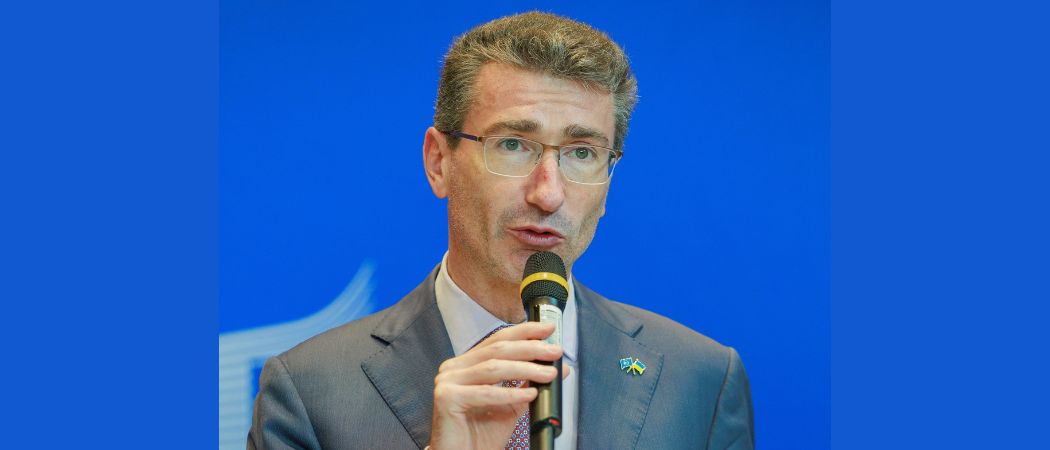A lack of clarity on an EU funding ban has led to some Hungarian researchers being excluded from European projects

Marc Lemaître, director-general for research and innovation at the European Commission, has sought to clarify Hungary's participation in Horizon Europe. Photo: Frédéric Sierakowski / European Union
The European Commission has moved to clarify the right of Hungarian researchers to participate in Horizon Europe projects, amidst concerns that a block on certain universities and institutions accessing EU funds is being misunderstood.
In an email seen by Science|Business, the director general of the Commission’s research directorate, Marc Lemaître, asked national contact points – advisers who support Horizon Europe applicants – to spread the message that Hungarian participants can still join Horizon Europe projects.
This is despite the fact that over 30 Hungarian institutions, including 21 universities, have been barred since December 2022 from receiving Horizon Europe and Erasmus+ funds, due to concerns their governance structure breaches rule of law principles.
The structures of the universities have gradually been overhauled by government edict over the past few years, transferring their management to public trust foundations and placing a great deal of control in the hands of boards of trustees made up of members who were initially hand-picked by the government.
The Hungarian government last year created a guarantee fund with an initial €12.8 million budget to cover the participation of researchers from the affected institutions in Horizon Europe projects.
But since the EU funding ban decision, there has been a reticence elsewhere in Europe to work with Hungarian partners, even those not affected by the ban. The Hungarian authorities say the communication has not made it clear enough that the block only relates to accessing EU funds, and not to participation in EU projects.
“The Commission has always provided proper legal information on this case, but the way they were advertising this situation, informing international partners and consortia members, was quite often misleading,” said Borbála Schenk, head of department for international affairs at Hungary's National Research Development and Innovation Office (NKFIH).
She welcomed Lemaître’s message, sent out in early May, saying her office had been pushing for this clarification since the beginning of the situation.
A lot of damage has already been caused by poor communication, Schenk said. The situation was exacerbated in April last year when a notification from the Commission was published on the EU Funding and Tenders Portal warning project coordinators about the impact on funding agreements with Hungarian entities.
The notification caused widespread confusion. “In the lack of information coming from the Commission, the cloud of misinformation just grew bigger and bigger,” said Schenk.
“Scientific partnerships that have been going on and nurtured for 10 - 15 years have been torn apart because of this situation,” she said. “We have been notified by [universities affected by the EU funding ban] that international partners are scared to partner with them, even if there is great cooperation with a long history, because they are afraid that proposals will not be evaluated.”
Poor communication was not only coming from the Commission, Schenk said, but other funding experts, evaluators or project officers.
During one information webinar on a Horizon Europe partnership, Hungary’s situation was shown on a slide alongside that of Russia and Belarus. Although the text clarified the difference, “It gave the impression that they were all in the same situation,” Schenk said. The Commission suspended research cooperation with Russia back in 2022 and is still assessing Belarus.
László Lengyel, vice president for science and international affairs at NKFIH, lamented the damage caused by misinformation about Hungary’s situation. “It is not only that our participation in several projects has been affected, but it will take months or even years to get back to the point where everyone understands that cooperating with Hungarian partners is okay,” he said.
No resolution in sight
Schenk and Lengyel did not comment on whether the EU Horizon Europe and Erasmus+ funding block is justified. “What we are doing is staying committed to supporting these universities and that is all that we can do,” Schenk said.
Lengyel is optimistic Brussels and Budapest will reach an agreement. “We are 100% sure that it will be resolved, the question is the timing, and during this intermediate period, we want to do everything to scale down the damage caused by misinformation,” he said.
The European Commission has been negotiating with the Hungarian government for over a year and a half to try to resolve the situation, but little progress has been made.
“We encourage transnational mobility and cooperation in education and research, and continue our dialogue with the Hungarian authorities on how to meet the conditions for access to the EU budget for Erasmus+ and Horizon Europe,” a spokesperson for the Commission said.
The Commission is unlikely to recommend the Council lifts the ban until Hungary takes steps to restructure the governance of the affected universities, while the Hungarian government considers the ban discriminatory.
The issue centres on specially created public trust foundations, set up by the government to manage higher education and cultural institutions in Hungary. The boards of these foundations have a significant amount of decision-making power and formal and informal ties to the government, despite there being limited transparency in how they operate.
Balázs Hankó, Hungarian state secretary for higher education and innovation, said during a recent trip to Brussels that the EU funding ban is “without any legal basis and applies double standards".
He also described the decision as “excluding researchers and Hungarian academics” from Erasmus+ and Horizon Europe, despite the fact that the ban only blocks funding through these programmes to certain Hungarian institutions, showing that misinformation is coming from all sides.
Hungary committed to Horizon Europe
As the funding ban debate rumbles on, Hungary is taking steps to support the internationalisation of its research sector.
The government is investing just over €86 million this year to fund Hungarian involvement in international programmes and domestic schemes for international collaboration. This sum is a significant increase on previous years, Lengyel said.
The money includes a budget for the new HU-rizon programme that will support international research projects led by Hungarian research teams. Although the name is a pun on Horizon Europe, Schenk and Lengyel said it is not a replacement for EU money, but a way to support Hungarian researchers to participate in Horizon Europe.
“We stay committed to Horizon Europe," Schenk said. This is evidenced by the government investment in international research and innovation collaboration, including increasing co-financing for EU partnerships.
Beyond investment, Hungary is also taking steps to align its national research funding schemes with European processes, to get Hungarian research teams used to the competitive EU methods.
“Internationalisation is important for Hungary, connecting not just with European partners but also those from, for example, Singapore and Japan,” Lengyel said.





 A unique international forum for public research organisations and companies to connect their external engagement with strategic interests around their R&D system.
A unique international forum for public research organisations and companies to connect their external engagement with strategic interests around their R&D system.